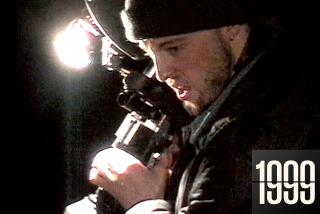Poptent’s amateurs sell cheap commercials to big brands
Build-a-Bear Workshop was introducing a line of stuffed animals called smallfrys and wanted to reach moms through Facebook. One video used in the online promotion showed a woman pulling up to a fast-food window. Her young daughter requests “a smallfry.” When her mom suggests a fruit cup or celery sticks, the daughter says, “Mom, order me a curly-haired bunny in a purple sequined bathing suit.”
The 45-second smallfrys spot came not from a traditional advertising agency but from Poptent Inc., a “crowdsourced” video production studio that has built a global community of 50,000 writers, directors, cinematographers and animators to create commercials for Build-a-Bear, American Airlines, Dell, Intel, Jaguar, General Mills and others.
It’s an example of how the Internet has enabled corporations to harness groups of far-flung enthusiasts to perform work once reserved for professionals. Even such creative endeavors as advertising aren’t exempt from the growing popularity of crowdsourcing.
“We loved the engagement and creativity that the Poptent community could bring to our brand and especially the launch of a new product,” said Maxine Clark, Build-A-Bear’s founder and chief executive. “It allowed us to stretch our budget.”
Advertising experts credit Doritos with demonstrating that passionate amateurs could match the creativity of Madison Avenue. The Frito-Lay brand’s “Crash the Super Bowl” contest, started six years ago, invited consumers to create their own 30-second spot, which it promised to air during the big game — advertising’s most prominent showcase. The winning entry, created for $12 by a group of amateur filmmakers from North Carolina, was selected from among 1,070 submissions.
“The Doritos thing was really interesting because it showed Joes off the street were not going to create a Super Bowl ad — but wedding videographers who were pretty funny guys could,” said Jeff Howe, a professor of media and technology at Northeastern University who in 2006 coined the phrase “crowdsourcing.”
Founder and Chairman Rick Parkhill got the idea for Poptent in part by watching his 12-year-old son shoot, edit and produce homemade music videos.
It “was a light that went on for me,” Parkhill said. “The low cost of being able to create full motion, sight and sound was revolutionary. It empowered people all over the globe … who could express themselves and tell stories in short form.”
Parkhill consulted two friends: Tony Romeo, the former chairman of Unilever’s Interactive Brand Center, and Neil Perry, a onetime senior marketing executive who oversaw digital initiatives for McDonald’s. Both confirmed his intuition that brands were struggling to create video for the Web. Perry and Romeo joined Parkhill in organizing and launching Poptent in 2007.
Poptent started with a community of 2,000 students, hobbyists and film school graduates willing to make fake commercials and vie for $1,000 prizes. For its first client, Poptent persuaded the century-old Swiss brand Nestle to hire Poptent to create an ad for its 100 Grand Bar.
Having succeeded with Nestle, Poptent began connecting brands and advertising agencies to its network of budding videographers.
The savings to brands are substantial. Poptent charges a $40,000 management fee, and the winning video creator collects a minimum $7,500 payment. A traditional television ad, by contrast, averages about $380,000 to $400,000, Poptent says.
Procter & Gamble’s Crest brand recently solicited Poptent’s community to create an ad for 3D Whitestrips. The 460 people who accepted the assignment were given access to a creative brief, which outlined the brand’s strategy and the message its marketers hope to convey, and provided media assets, including a logo and images, that could be used in the video. Some 65 videos were submitted, which the brand is evaluating.
“The old-world process is so different from our process,” Poptent CEO Andy Jedynak said. “It used to be that [a brand and ad agency would] step through concepts, storyboards, scripting. It’s tough to get through to the point when you got a spot done.”
“We equip a world of passionate creators to go independently, without micromanaging them, to come up with a complete end product,” Jedynak said. “So for our brands and their agency clients, they’ll sit in a room and they’ll watch 20, 30, 40 completed commercials — many of them are ready to air. “
Alan Maites, president and chief executive of Robinson & Maites, a Chicago marketing agency that has done work for Federal Express, Verizon, Nestle and Discover, said Poptent created high-quality 30- and 60-second ads for his clients to use online and on social networks.
“It gives us a variety of things to show our client,” Maites said. “Instead of showing them a rough cut of one video that they’ve seen on the storyboard, you go in and have a film festival with 25 different videos that they get to vote on.”
Even the commercials a client chooses not to buy can serve as an idea bank, which can spark future campaigns.
Chapman University film school graduate Mike Bernstein, 25, of Los Feliz said he joined Poptent after completing internships with “The Tonight Show With Conan O’Brien” and Focus Features studio. A commercial Bernstein created for Walgreens promoted a service that lets customers order items online to pick up later at the store — in this case showing a man discreetly buying feminine hygiene products for his wife.
The ad, which found humor in the sort of potentially embarrassing purchases consumers would make in advance from a pharmacy, was so successful online that Walgreens asked the filmmaker to reshoot it for television. The commercial aired in February and March in Chicago. Winners have not yet been announced publicly, but Poptent says the ad has been recognized with two Telly Awards for excellence in local television production.
“One day I’d love to direct a feature,” Bernstein said. “Right now, I’m just really really stoked that I get to do what I’m passionate about and pay the bills. There’s a lot of situations where I’m talking to people my age, and they hate what they’re doing. It’s great that I can’t relate.”
More to Read
The biggest entertainment stories
Get our big stories about Hollywood, film, television, music, arts, culture and more right in your inbox as soon as they publish.
You may occasionally receive promotional content from the Los Angeles Times.










